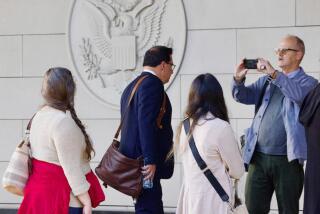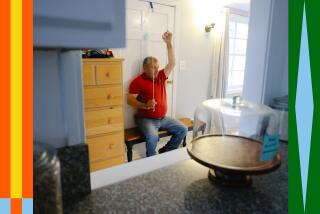Army Spc. Rudolph R. Hizon, 22, Los Angeles; killed in explosion in Afghanistan
- Share via
Filipino immigrant Rudolph Ryan Hizon had been in the United States for only three months in 2008 when he decided to join the Army. The 19-year-old, who was living in the Glassell Park area of Los Angeles, dreamed of becoming a pilot.
Hizon had just started classes at Glendale Community College, where an Army recruiter sparked his interest.
“First I didn’t want to let him sign up, because I wasn’t ready for that,” said his father, Rodolfo Hizon Jr. But two weeks later, he agreed.
While serving in Afghanistan, Army Spc. Rudolph Ryan Hizon was killed by an improvised explosive device Feb. 28 in Logar province, south of Kabul. He was assigned to the 2nd Battalion, 30th Infantry Regiment, 4th Brigade Combat Team, 10th Mountain Division at Ft. Polk, La. The infantryman was 22.
His death has devastated a tight-knit Manila family that immigrated to Los Angeles in search of a better life.
The grief of Hizon’s mother, Rachel Santiago, is especially acute; she had not seen her older son in three years.
U.S. immigration rules had forced her to stay in the Philippines when Ryan, his younger brother and sister and their father moved to Los Angeles three years ago.
During their time apart, Hizon missed his mother, his father said. To the young man, one of the main benefits of enlisting was the prospect that his military service could speed U.S. approval of his mother’s immigration, his relatives said. (Hizon’s parents are not married but have raised their children together.)
Hizon and his mother spoke often via Skype, even when he was camped in remote mountains in Afghanistan.
It was only after he died that she was able to come to the U.S. She joined his brother, sister and father for a solemn military ceremony outside a Burbank airport hangar, where they embraced and wept over Hizon’s flag-draped casket.
Although Hizon aspired to be a pilot, his direction in life was not yet clear. In Manila, where he grew up, he had taken a hotel and restaurant management class. In the military, he thought about becoming a medic.
“He wanted to explore everything,” his father said.
Photos on Hizon’s memorial website show a cheerful teenager, wearing a hoodie in one shot, iPod ear buds in another. In others, he sits at the wheel of a sports car, looking barely old enough to drive, and visits an amusement park with his brother and sister.
Hizon liked to flash sideways peace signs. He did it so often that after he died, 10 comrades in his unit each made the gesture in a photo in his honor. Dressed in battle fatigues, they surround Hizon’s empty combat boots, a helmet perched on the end of a rifle, and medals on either side. A framed picture of Hizon leans against the boots.
His Army service started in January 2009 with basic training at Ft. Benning, Ga., followed by infantry training at Ft. Polk. His unit deployed to Afghanistan in October.
Like many soldiers, Hizon grew tired of military rations. He was fond of pancit, a Filipino noodle dish, and, from time to time, would ask his father, “Dad, can you send me ramen again?” Rodolfo Hizon, who works the night shift in food service at a Pasadena hospital, looked forward to a phone call from his son every Friday — his day off — between 4 and 5 a.m.
In January, Hizon came home on leave. During his two-week visit, he bought gifts for his younger siblings: a watch for his sister, Rochelle Aimmie, 21; and clothes and video games for his brother, Rudolph Russell, 19. He kept in touch with them on Facebook.
On March 3, both siblings joined their father at Dover Air Force Base in Delaware to witness the arrival of Hizon’s casket. His mother, in Manila, could not make it to Dover in time. But she was there with the family for his body’s arrival in California and for his funeral and burial March 14 at Forest Lawn Memorial-Park, Glendale.
A few weeks later, at a naturalization ceremony in Afghanistan for the U.S. military, U.S. Ambassador Karl W. Eikenberry spoke of Hizon’s sacrifice.
“Specialist Hizon gave his life for the honor of his country,” the ambassador said at the event in Kandahar. “In addition to receiving the Bronze Star, Purple Heart and the National Defense Service Medal among many other awards and decorations, Specialist Hizon also became a citizen of the United States posthumously on March 14.
“Although Specialist Hizon was not able to swear the oath of citizenship, we know from his actions that in his heart, he was a true American. He cherished the United States and upheld her values until the end. I am proud that his family, particularly his mother, who remained in the Philippines, will now be eligible to receive her son’s survivor benefits.”
Santiago, who recently got her green card, lives now with her other two children and their father in Glassell Park. From their home, they can see the cemetery bluff where Hizon is buried.
Hizon’s father is thankful for his son’s citizenship but regrets that he never had the chance to enjoy being an American.
“It came too late,” he said.
More to Read
Start your day right
Sign up for Essential California for the L.A. Times biggest news, features and recommendations in your inbox six days a week.
You may occasionally receive promotional content from the Los Angeles Times.







